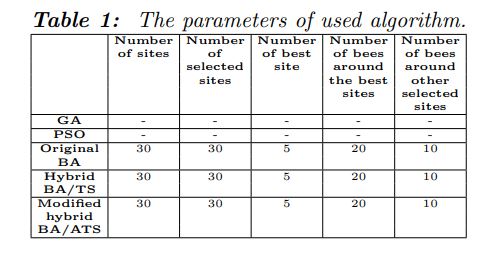Economic Dispatch using Modified Hybrid BA/ATS
Main Article Content
Abstract
In this paper, a new modified algorithm is proposed. This modified algorithm is BA/ATS. The main modifications are including negative value into the main equation of the bee algorithm (BA) and integrating adaptive tabu search (ATS) into BA. BA/ATS aims to improve the performance of hybrid BA/TS. The economic dispatch (ED) is set as the main problem to solve with the proposed algorithm. The operation of each generator is limit by constraints. All test results indicate that the overall costs of operation when using the proposed algorithm are better than test results from other compared algorithms. This means the modified hybrid BA/ATS is a good algorithm for the solving the ED problem.
Article Details

This work is licensed under a Creative Commons Attribution-NonCommercial-NoDerivatives 4.0 International License.
References
K. Y. Lee and A. E. Mohamed, Modern Heuristics Optimizaion Techniques, New York, John Wiley & Sons, 2008.
FACTS Terms & Definitions Task Force of the FACTS Working Group of the DC and FACTS Subcommittee, “Proposed Terms and Definitions for Flexible AC Transmission System (FACTS),” IEEE Transactions on Power Delivery, vol. 12, no. 4, October. 1997.
H. Ren, D. Watts, Z. Mi, and J. Lu, “A Review of FACTS’ Practical Consideration and Economic Evaluation,” Proceedings of Power and Energy Engineering Conference (APPEEC 2009, 2009.
S. Chansareewittaya, “Optimal Power Flow for Enhanced TTC with Optimal Number of SVC by using Improved Hybrid TSSA,” ECTI Transactions on Computer and Information Technology (ECTI-CIT), vol. 13, no. 1 (2019), pp. 9-20
R. Jomthong, P. Jirapong, and S. Chansareewittaya, “Optimal Choice and Allocation of Distributed Generations using Evolutionary Programming”, Proceeding of CIGRE-AORC 2011, Chiang Mai, Thailand, October 2011.
S. Chansareewittaya, “Hybrid MODE/TS for Environmental Dispatch and Economic Dispatch,” ECTI Transactions on Electrical Engineering, Electronics, and Communications (ECTI-EEC), vol. 17, no. 1 (2019), pp. 78-86.
Q. N. H., S. Chand, H. K. Singh, and T. Ray, “Genetic Programming With Mixed-Integer Linear Programming-Based Library Search,” IEEE Transactions on Evolutionary Computation, Vol. 22, Issue 5, 2018
L. L. Lai, Intelligent System Applications in Power Engineering: Evolutionary Programming and Neural Networks, New York, John Wiley & Sons, 1998.
M. R. AlRashidi and M. E. El-Hawary, “Applications of Computational Intelligence Techniques for Solving The Revived Optimal Power Flow Problem,” Electric Power Systems Research, vol. 79, issue 4, pp. 694-702, 2009.
F. Glover, “Tabu Search, Part I,” ORSA Journal on Computing, vol. 1, no. 3, pp. 190-206, Summer, 1989.
F. Glover, “Tabu Search, Part II,” ORSA Journal on Computing, vol. 2, no. 1, pp. 4-32, Winter, 1990.
S. Chansareewittaya, “Hybrid BA/ATS for Economic Dispatch Problem,” Proceeding of the 22nd International Computer Science and Engineering Conference (ICSEC) 2018, Chiang Mai, Thailand, November 2018.
S. Chansareewittaya, K. Soponronnarit, and P. Boonyanant, “Modified DE/Sin for Economic Dispatch and Environmental Dispatch,” Proceeding of International Conference on Business and Industrial Research (ICBIR) 2018, Bangkok, Thailand, May 2018.
J. P. Chiou, “Variable Scaling Hybrid Differential Evolution for Large-Scale Economic Dispatch Problems,” Electric Power Systems Research, vol. 77(3-4), pp. 212-218, March 2007.
J. P. Chiou, C. F. Chang, and C. C. Wang, “Hybrid Differential Evolution for Static Economic Dispatch,” Proceedings in 2014 International Symposium on Computer, Consumer and Control, June 2014.
S. Chansareewittaya, “Hybrid BA/TS for Economic Dispatch Considering the Generator Constraint,” Proceeding of International Conference on Digital Arts, Media and Technology (ICDAMT) 2017, Chiang Mai, Thailand, March 2017.
Uğur Güvenç, “Combined Economic Emission Dispatch Solution using Genetic Algorithm Based on Similarity Crossover,” Scientific Research & Essays Vol. 5(17), pp. 2451-2456, October 2010.
S. Chansareewittaya, “Hybrid Differential Evolutionary/Tabu Search for Economic Dispatch and Environmental Dispatch,” Proceeding of ECTI-CON2018, Chiang Rai, Thailand, July 2018.
C. Jiejin, M. Xiaoqian, L. Lixiang, and P. Haipeng, “Chaotic Particle Swarm Optimization for Economic Dispatch Considering The Generator Constraints,” Energy Conversion and Management vol.48, pp.645–653, 2007.
D. Karaboga and B. Basturk, “A Powerful and Efficient Algorithm for Numerical Function Optimization: Aritificial Bee Colony (ABC) Algorithm,” Journal of Global Optimization, vol. 39, no. 3, pp. 459-471, 2007.
S. Chansareewittaya and P. Jirapong, “Power Transfer Capability Enhancement with Multitype FACTS Controllers using Hybrid Particle Swarm Optimization,” Electrical Engineering, vol. 97, Issue 2, pp. 119-127, 2015.
S. Sujitjorn, T. Kulworawanichpong, D. Puangdownreong, and K. N. Areerak, “ Adaptive Tabu Search and Applications in Engineering Design,” Proceedings of the 2006 conference on Integrated Intelligent Systems for Engineering Design, pp. 233-257.
S. Suwannarongsri and D. Puangdownreong, “Adaptive Tabu Search for Traveling Salesman Problems,” International Journal of Mathematics and Computers in Simulation, vol. 6, issue 2, pp.274-281, 2012.
T. Kulworawanichpong, D. Puangdownreong, and S. Sujitjorn, “Finite Convergence of Adaptive Tabu Search”, ASEAN Journal on Science and Technology for Development, vol. 21, no. 2&3, pp. 103-115, 2004.
T. Phongkidakarn and D. Rerkpreeapong, “Economic Dispatch using Cuckoo Search Algorithm,” Kasetsart Engineering Journal. 27, 90 (Oct.-Dec. 2014), pp. 57-66


